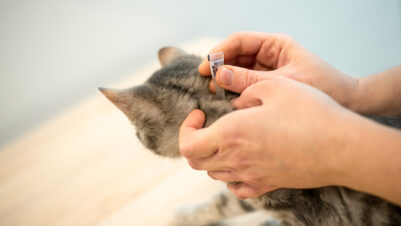
About 57 percent of UK households (16.2 million) house 38 million pets.
Although the number of pets is up from 35 million last year (a rise of 9 percent), there has been a fall in the proportion of households owning a pet, from 17.4 million (62 percent) in 2022.
The most popular pets list has also evolved with a 50 percent rise in the number of smaller pets such as rabbits, guinea pigs and hamsters. This population now at 5 million – 1.7 million more than the previous year.
Alongside a decrease of 6 percent in the dog and cat populations, which now stand at 12 million and 11 million, 13 percent (3.7 million households) admit to having relinquished a pet in 2022, with this figure rising to 28 percent among young owners (16 to 24 years old).
Looking at the pets relinquished, 47 percent gave up a dog, 36 percent a cat, 12 percent an indoor bird, 8 percent a rabbit, 6 percent a guinea pig and 7 percent another pet.
Following the pandemic pet-acquisition boom, especially among millennials and Gen-Z, 30 percent of these young owners now admit that the cost-of-living crisis has made them rethink pet ownership.
Nicole Paley of UK Pet Food comments: “World events have had a massive impact on lifestyles over the last few years.
“Throughout the pandemic, we saw an increase in people adding a pet to their family as they sought the amazing companionship a pet can bring.
“Today, owners are clearly impacted by the cost of living and sadly relinquishment figures are high. The small pet population is on the up, suggesting that people believe they are more manageable and less expensive to keep.
“Although pets bring huge joy to a household, they also come with a huge responsibility and it is so important to understand the care and cost implications – whatever the size of your pet.
“Startlingly, we discovered that only 29 percent of people considered the cost when they got a pet.
“Almost one fifth (18 percent) admitted that a pet was more expensive than they had considered.
“This figure rises to 23 percent among the youngest owners (16 to 24 years old) and families are also impacted with 15 percent of those with children finding it tough.”
Dr Samantha Gaines, from the RSPCA‘s companion animals department, says: “As the cost-of-living crisis deepens, more people are abandoning animals, more animals are coming into our care, and rehoming is slowing as financial pressures bite.
“It’s particularly worrying to see 13 percent needing to give up a pet, including really high numbers of younger owners.”
Natalie Powdrill-Wells, research officer at Woodgreen Pets Charity adds: “As a charity, we’re definitely feeling the impact of an increased small pet population in the UK – with a 250 percent increase in relinquishment requests for rabbits over the past two years.
“Although they’re smaller in size, it doesn’t mean they’re smaller in cost or responsibility, so we encourage careful consideration before taking on a pet of any species.”
The vast majority of pet owners will do anything for their pet. Giving up a pet – or making changes to their pet care routine is often a very last resort. However, UK Pet Food’s research does confirm that around 20 percent of owners have had to make cuts on pet insurance, vet visits and pet food.
This rises to over one quarter among the younger demographic.
Natalie Powdrill-Wells adds: “There are also more people coming to Woodgreen seeking help when they aren’t able to afford urgent veterinary care.
“In many cases, pet owners aren’t seeking early treatment for minor conditions, and are cancelling insurance policies due to financial worries, which can sadly lead to worsening health problems and unmanageable vet bills down the line.”
In times of crisis, the companionship of a pet can be even more important and valuable.
From a mental wellness perspective, it has been shown that companion animals support owners who are feeling stressed or depressed.
Over 50 percent of owners feel that pets support their mental well-being and this rises to over 60 percent among older people with a wide range of additional benefits such as fewer visits to the doctor.
“There is a need to raise awareness amongst potential owners on the financial responsibilities of pet ownership – while supporting all the amazing owners who are struggling.
“In times of crisis, many pet owners do not have a choice.
“This year, UK Pet Food wanted to support our colleagues in the welfare sector by analysing relinquishment and we are working closely with the Canine and Feline Sector Group to identify what the pet care sector can do to help. Plus, we have a guide for pet owners looking for pet food on a budget.”
UK Pet Food is also working with Fareshare – the charitable food redistribution network – and a coalition of animal welfare organisations to coordinate donations of pet food from our members.
This is part of their work to ensure that the pet food industry provides more immediate support to the most vulnerable owners and keeps pets and their families together during these challenging times.






